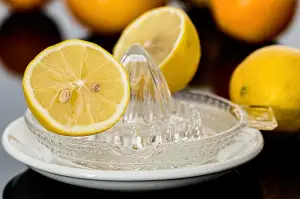Master the Art of Cast Iron Skillet Cleaning: A Guide to Keep Your Kitchen Shining

- Importance of proper cleaning for cast iron skillets
- Gathering the necessary cleaning supplies
- Step-by-step instructions for cleaning a cast iron skillet
- Tips for maintaining the seasoning of a cast iron skillet
- Common mistakes to avoid when cleaning a cast iron skillet
- Alternative methods for deep cleaning a cast iron skillet
Cast iron skillets are a beloved kitchen tool for many home cooks. Their durability and ability to retain heat make them perfect for searing, frying, and baking. However, proper cleaning is essential to maintain their longevity and performance. In this guide, we will explore the art of cast iron skillet cleaning, providing you with step-by-step instructions and helpful tips to keep your kitchen shining. So let's dive in and discover the secrets to mastering the art of cast iron skillet cleaning!
Importance of proper cleaning for cast iron skillets
Proper cleaning is crucial for maintaining the longevity and performance of your cast iron skillet. Neglecting to clean it properly can lead to a buildup of food residue, which can affect the flavor of your dishes and even promote the growth of bacteria. Additionally, improper cleaning techniques such as using harsh detergents or scrubbing vigorously can strip away the skillet's seasoning, leaving it vulnerable to rusting. By taking the time to clean your cast iron skillet correctly, you ensure that it remains in pristine condition and continues to be a reliable tool in your kitchen arsenal.
Gathering the necessary cleaning supplies
To properly clean a cast iron skillet, you will need a few essential cleaning supplies. First and foremost, you will need a stiff brush or sponge specifically designed for cast iron. Avoid using metal scrubbers or abrasive cleaners as they can damage the seasoning of the skillet. Additionally, you will need mild dish soap, kosher salt, white vinegar, and paper towels or a clean cloth. These items are readily available in most kitchens and will help ensure that your cast iron skillet is cleaned effectively without causing any harm to its surface.
Step-by-step instructions for cleaning a cast iron skillet
Step 4: Step-by-step instructions for cleaning a cast iron skillet
1. Allow the skillet to cool down completely after use. Never clean it while it's still hot, as this can damage the seasoning.
2. Rinse the skillet with warm water to remove any loose food particles. Avoid using soap at this stage, as it can strip away the seasoning.
3. If there are stubborn food residues, gently scrub the skillet with a soft brush or sponge. Avoid using abrasive materials that can scratch the surface.
4. For tougher stains, create a paste by mixing coarse salt and water. Apply the paste to the stained areas and scrub gently until the stains are removed.
5. Rinse the skillet thoroughly with warm water to remove all traces of salt or residue.
6. Dry the skillet completely using a clean towel or by placing it on low heat on your stovetop for a few minutes.
7. Once dry, apply a thin layer of oil to the entire surface of the skillet to prevent rusting and maintain its seasoning.
Remember, regular cleaning is essential for preserving your cast iron skillet's longevity and performance in the kitchen!
Tips for maintaining the seasoning of a cast iron skillet
To maintain the seasoning of your cast iron skillet, there are a few key tips to keep in mind. Firstly, avoid using soap when cleaning your skillet as it can strip away the seasoning. Instead, use hot water and a stiff brush to remove any food residue. Secondly, always dry your skillet thoroughly after cleaning to prevent rusting. You can do this by placing it on low heat on the stovetop or in the oven for a few minutes. Lastly, apply a thin layer of oil to the skillet after each use to help maintain its non-stick surface and prevent rust. By following these simple tips, you can ensure that your cast iron skillet remains well-seasoned and ready for all your cooking adventures.
Common mistakes to avoid when cleaning a cast iron skillet
When it comes to cleaning a cast iron skillet, there are some common mistakes that should be avoided. Firstly, never use soap or harsh detergents to clean the skillet as it can strip away the seasoning. Instead, opt for hot water and a stiff brush or sponge. Secondly, avoid soaking the skillet for long periods of time as it can cause rusting. Additionally, do not use metal scouring pads or abrasive cleaners as they can damage the surface of the skillet. Lastly, make sure to dry the skillet thoroughly after cleaning to prevent any moisture from causing rust. By avoiding these mistakes, you can ensure that your cast iron skillet stays in great condition for years to come.
Alternative methods for deep cleaning a cast iron skillet
Alternative methods for deep cleaning a cast iron skillet include using salt and oil or baking soda and water. To use salt and oil, sprinkle coarse salt onto the skillet and scrub it with a paper towel or brush. Rinse with warm water, dry thoroughly, and apply a thin layer of oil to prevent rusting. For baking soda and water, create a paste by mixing equal parts of baking soda and water. Apply the paste to the skillet, scrub gently, rinse, dry thoroughly, and season as usual. These methods are effective in removing stubborn stains without damaging the seasoning of the skillet.
In conclusion, mastering the art of cast iron skillet cleaning is essential for keeping your kitchen shining and your food tasting delicious. By following the proper cleaning techniques and using the right supplies, you can maintain the longevity and seasoning of your skillet. Remember to always dry it thoroughly to prevent rusting and avoid using harsh chemicals or abrasive materials that can damage the skillet's surface. With regular maintenance and care, your cast iron skillet will continue to be a reliable tool in your culinary adventures for years to come. Happy cooking!
Published: 19. 12. 2023
Category: Home



